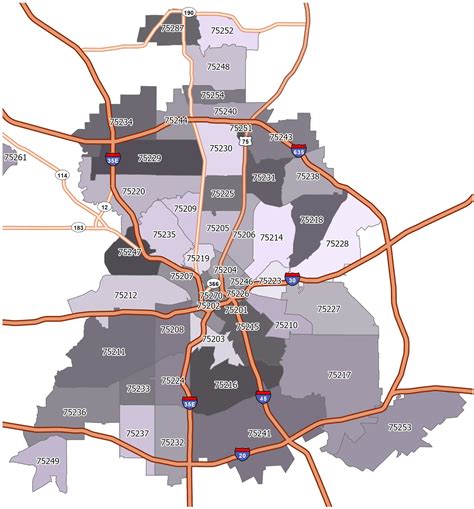Explore the history, significance, and impact of Dallas zip codes on property values, local services, and school districts. Understand how they are assigned and their future implications.If you’re a resident of Dallas, or considering a move to the area, understanding the city’s zip codes is essential. Dallas zip codes play a significant role in everything from property values to school districts, and even local services. In this blog post, we’ll explore the history of Dallas zip codes, how they are assigned, and the impact they have on various aspects of city life. We’ll also debunk common misconceptions about Dallas zip codes and look at the future of these important geographical markers. Whether you’re a prospective homebuyer, a curious resident, or just interested in learning more about Dallas, this post will give you a comprehensive overview of the role that zip codes play in shaping the city. Stay tuned as we delve into the intricacies of Dallas zip codes and their far-reaching effects.
Understanding Dallas Zip Codes
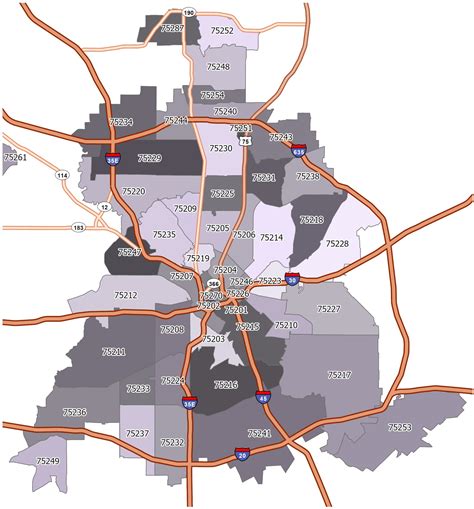
Dallas is a sprawling metropolis with over 30 different zip codes, each representing a specific area within the city. These zip codes play a crucial role in identifying neighborhoods, determining property values, and providing access to local services.
When it comes to understanding Dallas zip codes, it’s important to recognize that each one serves as a unique identifier for a specific geographical area. This allows for easier navigation and location-based services, as well as defining boundaries for various districts within the city.
One key aspect of Dallas zip codes is how they are assigned. The assignment of zip codes is carefully managed by the United States Postal Service, with input from local authorities and city planners. Zip codes are allocated based on population density, geographical boundaries, and the need for efficient mail delivery.
Dallas zip codes also have a significant impact on property values. Certain zip codes may be associated with higher or lower property values, and understanding the nuances of each code can help potential homebuyers make informed decisions. Additionally, zip codes can influence school district assignments, as well as access to local amenities and services.
In essence, understanding Dallas zip codes is essential for navigating and comprehending the diverse landscape of this vibrant city. By recognizing the significance of these zip codes, residents and visitors alike can gain a deeper understanding of the unique characteristics and features of each Dallas neighborhood.
The History of Dallas Zip Codes
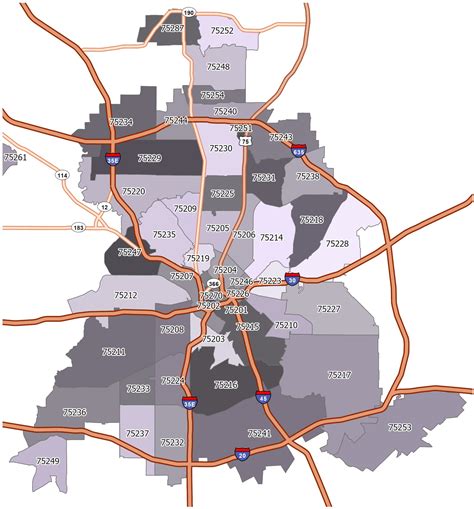
When we think of zip codes, we often take them for granted as a necessary part of addressing mail or packages. However, the history of Dallas zip codes is a fascinating journey that reflects the growth and development of the city.
It was in 1943 that the United States Postal Service introduced the zone improvement plan, or ZIP code, as a way to simplify the sorting and delivery of mail. Dallas was one of the early adopters of this system, and in 1963, the city was assigned its first set of postal codes.
The original Dallas zip codes were based on geographic areas and population density, with the aim of making mail delivery more efficient. As the city expanded and new neighborhoods developed, the system was updated and expanded to accommodate the growing population.
Over the years, the history of Dallas zip codes has been a reflection of the city’s urban planning and development. It has not only facilitated mail delivery, but has also played a role in shaping the identity and organization of different neighborhoods within the city.
Today, the history of Dallas zip codes continues to evolve as the city grows and changes. The impact of these codes on local services, property values, and school districts is a testament to their enduring significance in the fabric of the city.
The Importance of Dallas Zip Codes
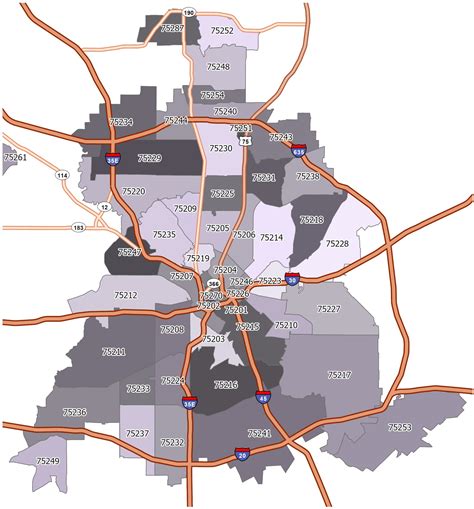
Zip codes may seem like a small detail in the grand scheme of things, but they actually play a crucial role in everyday life. From mail delivery to demographic data, Dallas zip codes have a significant impact on various aspects of the city.
One of the key reasons why Dallas zip codes are important is for the efficient delivery of mail and packages. Each zip code is designated to a specific area, making it easier for postal workers to sort and deliver mail to the correct locations. This ensures that residents and businesses receive their mail in a timely manner.
Dallas zip codes also provide valuable demographic information. They are used to gather data on population trends, income levels, and other important statistics. This data is invaluable for businesses, researchers, and policymakers who need to understand the makeup of different areas within the city.
Additionally, Dallas zip codes can have an impact on property values. Certain zip codes may be more desirable due to their proximity to amenities, schools, or other factors. This can lead to variations in property values within the city, and having a good understanding of zip codes can be beneficial for both buyers and sellers in the real estate market.
In summary, Dallas zip codes are not just random numbers – they are a vital part of the city’s infrastructure. They influence mail delivery, demographic data, and even property values. Understanding the importance of zip codes can provide valuable insights for residents, businesses, and anyone with an interest in the city of Dallas.
How Dallas Zip Codes Are Assigned
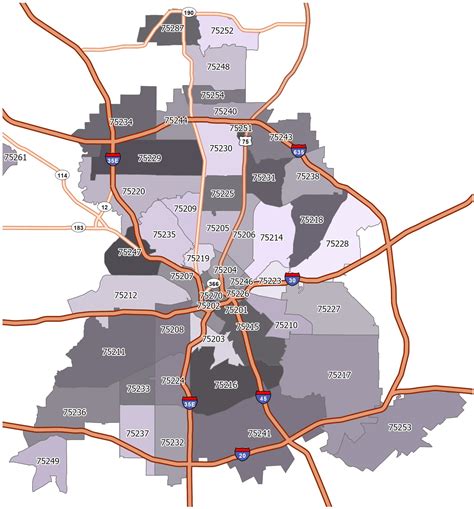
How Dallas Zip Codes Are Assigned
Have you ever wondered how Dallas Zip Codes are assigned? The process of assigning zip codes involves a lot of factors and criteria that need to be considered. It is not merely a random allocation of numbers, but rather a strategic and organized process.
One of the main factors that determines how Dallas Zip Codes are assigned is the geographical location of the area. Zip codes are designed to make mail delivery more efficient, so they are assigned based on the geographic area they cover. This means that different areas of Dallas will have different zip codes, depending on their location within the city.
Another important consideration in the assignment of Dallas Zip Codes is the population density of the area. Areas with higher population density will often have more zip codes assigned to them, in order to manage the volume of mail and packages being delivered. Conversely, areas with lower population density may have fewer zip codes assigned to them.
In addition to geography and population density, other factors such as land use, transportation routes, and community boundaries also play a role in the assignment of Dallas Zip Codes. These factors are taken into account to ensure that each zip code serves a specific and manageable area, and that mail can be delivered efficiently to all parts of the city.
Exploring Different Dallas Zip Code Areas
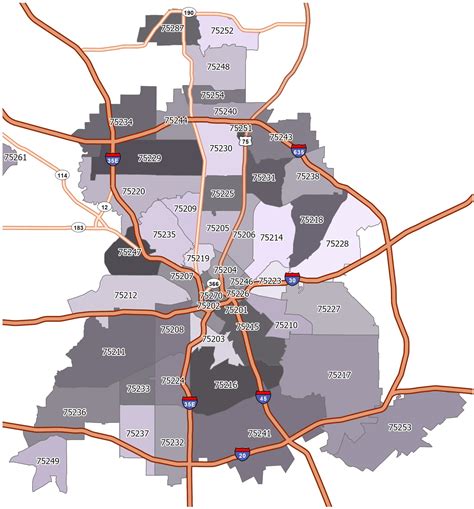
When exploring different Dallas zip code areas, it’s important to understand the unique characteristics and demographics of each area. Dallas is a large and diverse city, and each zip code represents a distinct community with its own identity and culture.
Some of the most popular zip code areas in Dallas include 75201, known for its high-end shopping and dining options, and 75204, which is home to the vibrant and trendy Uptown neighborhood. Each zip code area has its own attractions and amenities that make it an appealing place to live or visit.
It’s also important to consider factors such as crime rates, school districts, and property values when evaluating different Dallas zip code areas. For example, zip code 75205 is known for its upscale homes and prestigious school district, while zip code 75230 offers a more suburban and family-friendly atmosphere.
By exploring different Dallas zip code areas, individuals can gain a better understanding of the city’s diverse neighborhoods and make informed decisions about where to live or invest in real estate. Whether it’s the arts and culture scene in 75223 or the historic charm of 75248, each zip code area has something unique to offer.
The Impact of Dallas Zip Codes on Property Values
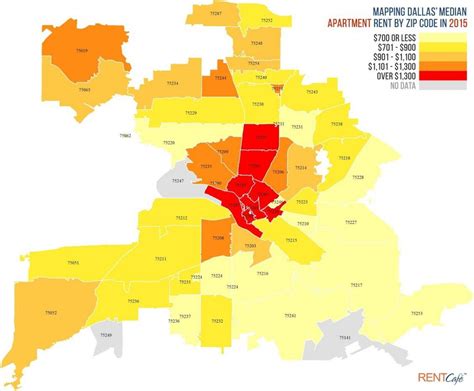
When it comes to buying or selling a house in Dallas, the zip code can have a significant impact on the property values. Different areas within the city can have vastly different real estate markets, and zip codes often play a key role in determining these market dynamics.
For example, certain zip codes may be known for their proximity to top-rated schools, vibrant cultural scenes, or trendy shopping and dining districts, all of which can contribute to higher property values. On the other hand, zip codes that are situated in more industrial or less desirable areas may see lower property values.
Additionally, zip codes can impact property values through the availability and quality of local services and amenities. Areas with well-maintained parks, public transportation options, and low crime rates can often command higher property values compared to those with fewer amenities and resources.
It’s important for homebuyers and sellers to be aware of the potential impact of zip codes on property values, as this knowledge can help them make informed decisions about where to buy or sell a home in Dallas.
Common Misconceptions About Dallas Zip Codes
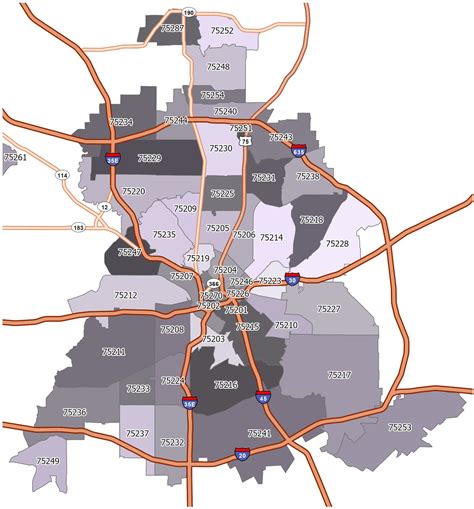
One common misconception about Dallas zip codes is that they determine the quality of a neighborhood. However, this is not necessarily true as different zip codes can contain a mix of affluent and lower-income areas. It’s important to not make assumptions about a neighborhood based solely on its zip code.
Another misconception is that Dallas zip codes are assigned randomly. In reality, zip codes are carefully planned and assigned based on geographic boundaries, population density, and other factors. Zip codes are designed to efficiently route mail and packages and are not arbitrary.
Some people believe that Dallas zip codes do not affect property values. This is untrue, as zip codes can play a significant role in determining the value of a property. Certain zip codes may be associated with desirable school districts, amenities, or proximity to city centers, which can impact property values.
There is also a misconception that Dallas zip codes have no impact on local services. In reality, zip codes are used to allocate resources for services such as schools, emergency response, and community programs. Different zip codes may receive different levels of funding and support for these services.
Lastly, some people mistakenly believe that Dallas zip codes have no effect on school districts. In fact, zip codes are often used to determine school district boundaries, which can impact the quality of education and the resources available to students.
The Role of Dallas Zip Codes in Local Services
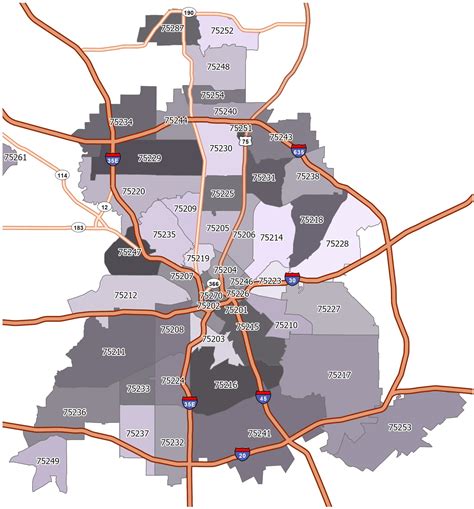
When it comes to providing local services in Dallas, zip codes play a crucial role in ensuring that residents receive the support they need. From healthcare facilities to emergency response teams, local services are tailored to meet the specific needs of each zip code area.
One of the key ways in which zip codes affect local services is through the allocation of resources. Different zip code areas have varying populations and demographics, which means that the demand for services such as hospitals, schools, and fire stations can differ greatly from one area to another. By using zip codes to identify the specific areas in need, local authorities and service providers can allocate resources more effectively.
Furthermore, Dallas zip codes also impact the planning and organization of local services. For example, city planners use zip code data to determine the location of new public facilities and infrastructure projects. This ensures that services are accessible and evenly distributed across different areas of the city, taking into account factors such as population density and geographic limitations.
In addition, local service providers rely on zip code information to deliver targeted services to the community. From public health initiatives to educational programs, understanding the demographics and needs of each zip code area allows service providers to tailor their offerings to meet the specific requirements of the local population.
Overall, the role of Dallas zip codes in local services is integral to ensuring that residents have access to the support and resources they need to thrive in their communities. By leveraging zip code data, local authorities and service providers can better understand the needs of each area and deliver effective, targeted services to address those needs.
How Dallas Zip Codes Affect School Districts
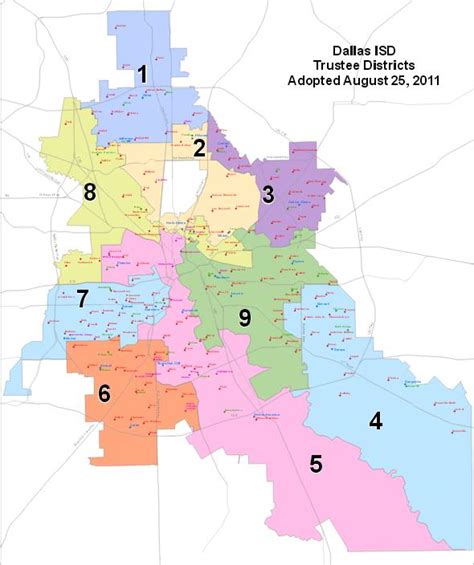
How Dallas Zip Codes Affect School Districts
When it comes to the education system in Dallas, zip codes play a crucial role in determining which school district a student will be a part of. The city is divided into various zip code areas, with each area corresponding to a specific school district. This means that the zip code in which a family resides directly impacts the school their child will attend.
For example, the Highland Park Independent School District is renowned for its high academic standards and exceptional facilities, making it a sought-after district for families. However, access to this school district is primarily limited to families living within the Highland Park zip code area. Conversely, families residing in other zip code areas may not have the same access to this prestigious school district.
In addition to influencing the school district a student can attend, zip codes also affect the resources allocated to each school. Funding for schools is often distributed based on the area’s needs and demographic characteristics, which are closely tied to the zip codes within the district. This means that students in different zip code areas may have varying access to educational resources, extracurricular activities, and support services.
Furthermore, the affluence or income level associated with certain zip codes can also impact the quality of education available in a specific school district. Areas with higher average incomes may have more resources available to them, leading to better schools and opportunities for students. On the other hand, students in lower-income zip code areas may face challenges related to funding and access to educational support.
Ultimately, Dallas zip codes play a significant role in shaping the education landscape of the city. The district in which a school is located, the resources available to students, and the overall quality of education can all be influenced by the zip code in which a family resides, highlighting the impact of zip codes on school districts.
The Future of Dallas Zip Codes
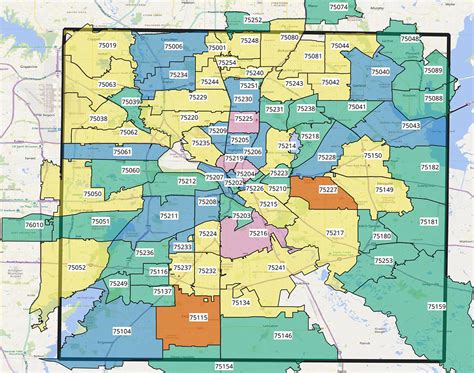
The Future of Dallas Zip Codes
As the city of Dallas continues to grow and develop, the future of its zip codes is a topic of great interest. Zip codes play a crucial role in how the city is organized and how its services are distributed, so understanding how they might change in the future is important for residents and businesses alike.
One potential future trend for Dallas zip codes is the addition of new codes to accommodate the city’s expanding population. With more people moving to the city every year, there may be a need for new zip codes to prevent overcrowding and to ensure that all areas receive adequate services.
Another possible change on the horizon for Dallas zip codes is a restructuring of existing codes to better reflect the city’s evolving demographics. As neighborhoods change and develop, the current zip code boundaries may need to be adjusted to more accurately represent the communities they serve.
In addition, advances in technology and changes in the way we shop and receive goods may also impact the future of Dallas zip codes. As online shopping continues to grow in popularity, there may be a need for new zip codes to accommodate the increasing volume of deliveries being made to homes and businesses throughout the city.
Overall, the future of Dallas zip codes is likely to be shaped by the city’s growth and development, as well as by changes in technology and the way we live our lives. It will be important for city planners and residents alike to stay informed about potential changes to zip codes and to be prepared to adapt to them as necessary.
| New Zip Codes | Restructuring | Technological Advances |
|---|---|---|
| Accommodating the expanding population | Reflecting the evolving demographics | Impact of online shopping and deliveries |
Frequently Asked Questions

What are the most well-known areas in Dallas?
Some of the most popular areas in Dallas include Uptown, Downtown, Deep Ellum, and Oak Lawn.
What are some fun things to do in Dallas?
Visitors to Dallas can enjoy the Dallas Museum of Art, the Sixth Floor Museum at Dealey Plaza, and the Dallas Arboretum and Botanical Garden.
What is the average cost of living in Dallas?
The cost of living in Dallas is slightly lower than the national average, with affordable housing options and a reasonable cost of groceries and transportation.
What are the best restaurants in Dallas?
Some top-rated restaurants in Dallas include Pecan Lodge for barbecue, Tei-An for Japanese cuisine, and Rise No. 1 for soufflés.
What is the climate like in Dallas?
Dallas has a humid subtropical climate, with hot summers and mild winters. It is known for its occasional thunderstorms and tornadoes.
What are some famous landmarks in Dallas?
Famous landmarks in Dallas include the Reunion Tower, the Dallas World Aquarium, and the Old Red Museum.
Is Dallas a good place to work and live?
Dallas offers a strong job market, a diverse culture, and a range of housing options, making it a popular choice for both working and living.

